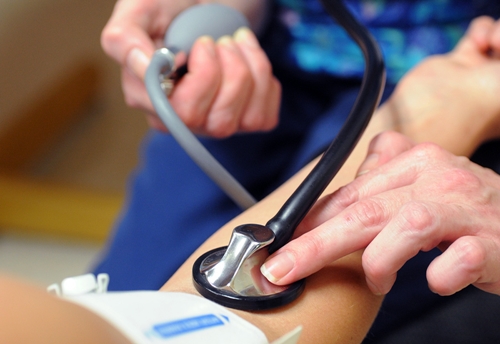31 May 2017. An analysis of medical insurance claims shows fixed-dose combination drugs to be the most cost-effective medication strategy for people with hypertension, or high blood pressure. The analysis by a team from University of Florida and Auburn University appears in the June 2017 issue of the Journal of Managed Care and Specialty Pharmacy.
Researchers led by Florida health policy professor Kalyani Sonawane sought to gauge the health care cost impacts of medications prescribed for hypertension. In the U.S., high blood pressure is a widespread problem, affecting 75 million people, or about 1 in 3 adults, according to Centers for Disease Control and Prevention. But only about half (54%) of Americans have the condition under control, raising risks of heart disease and stroke, the leading causes of death in the U.S.
Getting hypertension under control, however, is tricky since combinations of drugs and their doses often need to be adjusted to find what works from one person to the next. Sonawane and colleagues assessed different medication strategies to help people with hypertension and their clinicians find the right approach, in this case focusing on economic factors. In earlier studies, she evaluated physicians’ prescription patterns and patient outcomes, and found about half of people prescribed drugs for hypertension need to make changes in their medications in the first year of treatment.
The researchers reviewed health insurance claims kept by Blue Cross/Blue Shield of Texas, from 2008 to 2012. From these records, the team identified some 6,000 individuals with hypertension who needed adjustments in their drugs. The researchers looked specifically at the type of changes the individuals needed to make with their medications:
– Fixed-dose drug combinations, where 2 drugs are combined into a single pill
– Fixed-pill combinations, where people take multiple pills
– Switching from one kind of drug to another
– Increasing the dose or frequency of a drug
– Decreasing the dose or frequency of a drug
For each of these adjustments, the authors calculated costs of the drugs, but also subsequent costs of care patients needed in the year following the start of treatment for high blood pressure, both in a clinic or hospital or out-patient care. The analysis broke out the subsequent health care costs for treating cardiovascular conditions as well as total health care services.
The results show fixed-dose drug combinations to be the most expensive medications, costing patients on average $310.00. Fixed-pill combinations cost an average of $247.00 followed by switching drugs at $135.00, increasing dosage or frequency at $63.00 and decreasing dosage or frequency at $61.00.
But when subsequent costs of care are taken into account, fixed-dose combinations emerge as the most cost-effective. In the year following initial treatment, people with fixed-dose combinations paid on average $208.00 for additional cardiovascular care, the lowest expenditure of the different strategies. Individuals with fixed pill combinations paid on average $770.00 in that period, followed by $412.00 for increasing dosage, $279.00 for switching drugs, and $222.00 for decreasing dosage.
The similar pattern appears for all health care costs. In the year following initial treatment, people with fixed-dose combinations, along with those who switched to other drugs or had their dosages increased, paid on average between $4,500 and $5,000. People with fixed-pill combinations and those whose dosages were decreased paid between $6,600 and $7,000 for all health services in the year following treatment.
The authors conclude that higher price tag for fixed-dose drug combinations may scare off some individuals and their doctors, but they appear to result in lower overall costs for the patient in as little as a year. “Even though the drug costs for fixed-dose combination appear to be extremely high,” says Sonawane in a university statement, “it is offset by savings in health services costs, saving almost seven times the cost in inpatient visits.”
More from Science & Enterprise:
- Smartphone Test Results Speed Hospital Patient Release
- Public Access to Drugs Meets Health Needs, Cuts Costs
- Online Pharmacies Seen Fueling Antibiotic Overuse
- Targeted Leukemia Drugs Sharply Raising Costs of Care
- Breast Cancer Drug Costs Vary Among Insured Patients
* * *


 RSS - Posts
RSS - Posts
You must be logged in to post a comment.